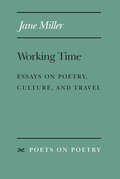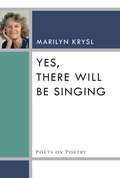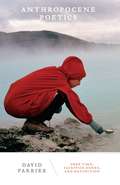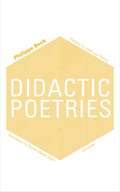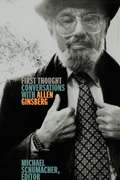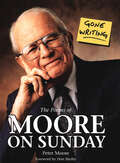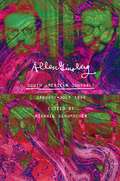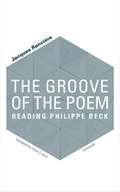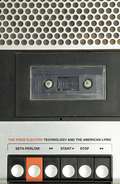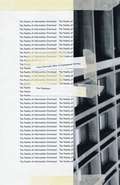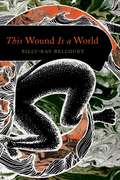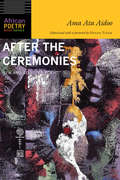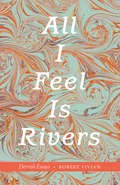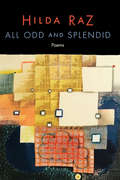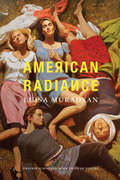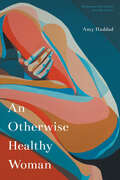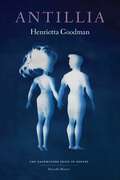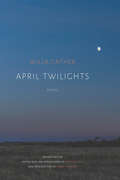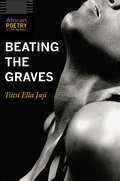- Table View
- List View
Working Time: Essays on Poetry, Culture, and Travel (Poets On Poetry)
by Jane MillerWorking Time collects essays by prize-winning poet Jane Miller on the subjects of poetry, travel, and culture. The discussions of contemporary poetry begin with excursions into geography, where language literally “takes shape.” Each essay is set in a landscape, where the notion of travel as a poetic experience, from the American Southwest to places in Italy, France, and Spain, is explored. The essays consider notions of time, duration, narrative, documentary, and history in American poetry, and view poetry in the light of developments in feminism, postmodern theory, and contemporary poetic practice. In addition to poetry, Miller investigates a range of cultural products and art forms, including film, video, photography, painting, sculpture, music, and the Madonna phenomenon.
Yes, There Will Be Singing
by Marilyn KryslYes, There Will Be Singing brings together Marilyn Krysl's essays on the origins of language and poetry, poetic form, the poetry of witness, and poetry's collaboration with the healing arts. Beginning with pieces on her own origins as a poet, she branches into poetry's profound spiritual and political possibilities, drawing on rich examples from poets such as Anna Akhmatova, W.S. Merwin, and Vénus Khoury-Ghata. Krysl concludes with a selection of stories of her nursing and humanitarian work, powerfully connecting poetic expression with a generous and compassionate worldview.
Anishinaabe Songs for a New Millennium
by Marcie R. RendonPoem-songs summon the voices of Anishinaabe ancestors and sing to future generationsThe ancestors that walk with us, sing us our song. When we get quiet enough, we can hear them sing and make them audible to people today. In Anishinaabe Songs for a New Millennium, Marcie R. Rendon, a member of the White Earth Nation, summons those ancestors&’ songs, and so begins the dream singing for generations yet to come. &“The Anishinaabe heard stories in their dream songs,&” Ojibwe author Gerald Vizenor wrote, and like those stories once inscribed in pictographs on birch-bark scrolls, Rendon&’s poem-songs evoke the world still unfolding around us, reflecting our place in time for future generations. Through dream-songs and poem-songs responding to works of theater, choral music, and opera, Rendon brings memory to life, the senses to attention—to see the moonbeams blossoming on the windowsill, to feel the hold of the earth, to hear the echo of grandmother&’s breath, to lie on the bones of ancestors and feel the rhythms of silence running deep. Her singing, breaking the boundaries that time would impose, carries the Anishinaabe way of life and way of seeing forward in the world.
Anthropocene Poetics: Deep Time, Sacrifice Zones, and Extinction (Posthumanities #50)
by David FarrierHow poetry can help us think about and live in the Anthropocene by reframing our intimate relationship with geological time The Anthropocene describes how humanity has radically intruded into deep time, the vast timescales that shape the Earth system and all life-forms that it supports. The challenge it poses—how to live in our present moment alongside deep pasts and futures—brings into sharp focus the importance of grasping the nature of our intimate relationship with geological time. In Anthropocene Poetics, David Farrier shows how contemporary poetry by Elizabeth Bishop, Seamus Heaney, Evelyn Reilly, and Christian Bök, among others, provides us with frameworks for thinking about this uncanny sense of time.Looking at a diverse array of lyric and avant-garde poetry from three interrelated perspectives—the Anthropocene and the &“material turn&” in environmental philosophy; the Plantationocene and the role of global capitalism in environmental crisis; and the emergence of multispecies ethics and extinction studies—Farrier rethinks the environmental humanities from a literary critical perspective. Anthropocene Poetics puts a concern with deep time at the center, defining a new poetics for thinking through humanity&’s role as geological agents, the devastation caused by resource extraction, and the looming extinction crisis.
Didactic Poetries (Univocal)
by Philippe BeckComplex, haunting, imaginative and profoundly literary, Didactic Poetries is Beck&’s response to Schiller&’s statement: &“We are still waiting for a didactic poem where thought itself would be and would remain poetic,&” and Hegel&’s claim that, &“strictly speaking, didactic poetry isn&’t poetry.&”For the acclaimed French poet, Philippe Beck, Schiller&’s task of attempting a didactic poetry remains as vital today as it was for Schiller&’s time. Is there a way to construct a poetry built and chiseled, hammered and stitched, from out of past narratives and poetries, condensed in such a manner as to make new poetic verses sing new truths? Forging a singular attempt to echo the poets and tales of a bygone age, Beck&’s didactic poetries perhaps carve out the path for renewing a poetic thought as a quasi-musical atmosphere where the reader can glimpse &“A small country &“sculpted&” as spiritual, supposed to be so at home in the Bygone Country. Alluvial layers so light, that weather disappeared, weary of variety a priori.&” Beck&’s deftly textured poems interweave contemporary commentary with cultural, historical, literary, and philosophical allusions, drawing the reader into a world of lived poetic experience.
First Thought: Conversations with Allen Ginsberg
by Michael Schumacher&“The way to point to the existence of the universe is to see one thing directly and clearly and describe it. . . . If you see something as a symbol of something else, then you don't experience the object itself, but you're always referring it to something else in your mind. It's like making out with one person and thinking about another.&” —Ginsberg speaking to his writing class at Naropa Institute, 1985With &“Howl&” Allen Ginsberg became the voice of the Beat Generation. It was a voice heard in some of the best-known poetry of our time—but also in Ginsberg&’s eloquent and extensive commentary on literature, consciousness, and politics, as well as his own work. Much of what he had to say, he said in interviews, and many of the best of these are collected for the first time in this book. Here we encounter Ginsberg elaborating on how speech, as much as writing and reading, and even poetry, is an act of art.Testifying before a Senate subcommittee on LSD in 1966; gently pressing an emotionally broken Ezra Pound in a Venice pensione in 1967; taking questions in a U.C. Davis dormitory lobby after a visit to Vacaville State Prison in 1974; speaking at length on poetics, and in detail about his &“Blake Visions,&” with his father Louis (also a poet); engaging William Burroughs and Norman Mailer during a writing class: Ginsberg speaks with remarkable candor, insight, and erudition about reading and writing, music and fame, literary friendships and influences, and, of course, the culture (or counterculture) and politics of his generation. Revealing, enlightening, and often just plain entertaining, Allen Ginsberg in conversation is the quintessential twentieth-century American poet as we have never before encountered him: fully present, in pitch-perfect detail.
Gone Writing: The Poems of Moore on Sunday
by Peter MooreHumorous poetry from the television program hosted by a beloved Minnesota news anchor. In the 1950s, Dave Moore, a young actor born and raised in Minneapolis, accepted a newscaster position with the local CBS affiliate, WCCO-TV-a job Walter Cronkite turned down. For the next three decades, until his death in 1998, he delivered the evening news with integrity, conviction, humor, and flair, making him a fixture in Minnesota living rooms. At the end of his weekly news-in-review program, Moore on Sunday (or, as he liked to call it, &“Moron Sunday&”), Moore often signed off by reciting a poem. These poems, composed by Moore&’s son Peter and collected here for the first time, offer a fresh and funny take on the common and not-so-common stuff of our everyday lives. Reminiscent of Ogden Nash and Tom Lehrer, with a dash of Dr. Seuss, Peter Moore&’s verse captures the essence of his father&’s wit, common sense, honesty, and warmth.
Le Maya Q'atzij/Our Maya Word: Poetics of Resistance in Guatemala (Indigenous Americas)
by Emil’ KemeBringing to the fore the voices of Maya authors and what their poetry tells us about resistance, sovereignty, trauma, and regeneration In 1954, Guatemala suffered a coup d&’etat, resulting in a decades-long civil war. During this period, Indigenous Mayans were subject to displacement, disappearance, and extrajudicial killing. Within the context of the armed conflict and the postwar period in Guatemala, K&’iche&’ Maya scholar Emil&’ Keme identifies three historical phases of Indigenous Maya literary insurgency in which Maya authors use poetry to dignify their distinct cultural, political, gender, sexual, and linguistic identities.Le Maya Q&’atzij / Our Maya Word employs Indigenous and decolonial theoretical frameworks to critically analyze poetic works written by ten contemporary Maya writers from five different Maya nations in Iximulew/Guatemala. Similar to other Maya authors throughout colonial history, these authors and their poetry criticize, in their own creative ways, the continuing colonial assaults to their existence by the nation-state. Throughout, Keme displays the decolonial potentialities and shortcomings proposed by each Maya writer, establishing a new and productive way of understanding Maya living realities and their emancipatory challenges in Iximulew/Guatemala.This innovative work shows how Indigenous Maya poetics carries out various processes of decolonization and, especially, how Maya literature offers diverse and heterogeneous perspectives about what it means to be Maya in the contemporary world.
Outward: Adrienne Rich's Expanding Solitudes
by Ed PavlicThe first scholarly study of Adrienne Rich&’s full career examines the poet through her developing approach to the transformative potential of relationships Adrienne Rich is best known as a feminist poet and activist. This iconic status owes especially to her work during the 1970s, while the distinctive political and social visions she achieved during the second half of her career remain inadequately understood. In Outward, poet, scholar, and novelist Ed Pavlić considers Rich&’s entire oeuvre to argue that her most profound contribution in poems is her emphasis on not only what goes on &“within us&” but also what goes on &“between us.&” Guided by this insight, Pavlić shows how Rich&’s most radical work depicts our lives—from the public to the intimate—in shared space rather than in owned privacy.Informed by Pavlić&’s friendship and correspondence with Rich, Outward explores how her poems position visionary possibilities to contend with cruelty and violence in our world. Employing an innovative framework, Pavlić examines five kinds of solitude reflected in Rich&’s poems: relational solitude, social solitude, fugitive solitude, dissident solitude, and radical solitude. He traces the importance of relationships to her early writing before turning to Rich&’s explicitly antiracist and anticapitalist work in the 1980s, which culminates with her most extensive sequence, &“An Atlas of the Difficult World.&” Pavlić concludes by examining the poet&’s twenty-first century work and its depiction of relationships that defy historical divisions based on region, race, class, gender, and sexuality.A deftly written engagement in which one poet works within the poems of another, Outward reveals the development of a major feminist thinker in successive phases as Rich furthers her intimate and erotic, social and political reach. Pavlić illuminates Rich&’s belief that social divisions and the power of capital inform but must never fully script our identities or our relationships to each other.
South American Journals: January–July 1960
by Allen GinsbergThe great Beat poet&’s observations, reflections, poetry, and mind-expanding explorations while traveling through South America When Allen Ginsberg went to South America in 1960, ostensibly to attend a literary conference, he had a different kind of trip in mind. This would be another experience in the Beat poet&’s journey deep into the realm of consciousness, the inward travel explored to exhilarating effect in his writing—whether in the poetry that had already earned him international acclaim or in the idiosyncratic journals that raised self-documentation to a new form of art. In his South American Journals, covering a tumultuous six months, Ginsberg describes his travels through Chile and Peru, his visit to Machu Picchu, and his search for a source for ayahuasca, or yagé, a mind-expanding drug recommended by his friend William S. Burroughs, another writer well traveled in altered states of consciousness.Far from quotidian diary entries, Ginsberg&’s observations in these pages, interspersed with poetry, dream notations, and musings about spirituality, amount to a critical chapter in the poet&’s informal autobiography. Writing more during these six months than in any of his other journals, Ginsberg summons great ferment. In his distinctive accounts of all that he encounters, elevating travel writing to lyrical expression; in an abundance of poems published here for the first time, in both first drafts and polished forms; in his reports of fascinating conversations; and, in particular, in detailed passages that delve into inner recesses of his consciousness, Ginsberg recreates a journey like no other, one that reflects the workings of one of the best minds of his generation in the world of his own making and in its mysterious, immutable counterpart in the South American landscape.
The Environmental Unconscious: Ecological Poetics from Spenser to Milton
by Steven SwarbrickBringing psychoanalysis to bear on the diagnosis of ecological crisis Why has psychoanalysis long been kept at the margins of environmental criticism despite the many theories of eco-Marxism, queer ecology, and eco-deconstruction available today? What is unique, possibly even traumatic, about eco-psychoanalysis? The Environmental Unconscious addresses these questions as it provides an innovative and theoretical account of environmental loss focused on the counterintuitive forms of enjoyment that early modern poetry and psychoanalysis jointly theorize.Steven Swarbrick urges literary critics and environmental scholars fluent in the new materialism to rethink notions of entanglement, animacy, and consciousness raising. He introduces concepts from psychoanalysis as keys to understanding the force of early modern ecopoetics. Through close readings of Edmund Spenser, Walter Ralegh, Andrew Marvell, and John Milton, he reveals a world of matter that is not merely hyperconnected, as in the new materialism, but porous and off-kilter. And yet the loss these poets reveal is central to the enjoyment their works offer—and that nature offers.As insightful as it is engaging, The Environmental Unconscious offers a provocative challenge to ecocriticism that, under the current regime of fossil capitalism in which everything solid interconnects, a new theory of disconnection is desperately needed. Tracing the propulsive force of the environmental unconscious from the early modern period to Freudian and post-Freudian theories of desire, Swarbrick not only puts nature on the couch in this book but also renews the psychoanalytic toolkit in light of environmental collapse.
The Fall of America Journals, 1965–1971
by Allen GinsbergAn autobiographical journey through America in the turbulent 1960s—the essential backstory to Ginsberg&’s National Book Award–winning volume of poetry Published in 1974, The Fall of America was Allen Ginsberg&’s magnum opus, a poetic account of his experiences in a nation in turmoil. What his National Book Award–winning volume documented he had also recorded, playing a reel-to-reel tape machine given to him by Bob Dylan as he traveled the nation&’s byways and visited its cities, finding himself again and again in the midst of history in the making—or unmaking. Through a wealth of autopoesy (transcriptions of these recorded poems) published here for the first time in the poet&’s journals of this period, Ginsberg can be overheard collecting the observations, events, reflections and conversations that would become his most extraordinary work as he witnessed America at a time of historic upheaval and gave voice to the troubled soul at its crossroads.The Fall of America Journals, 1965–1971 contains some of Ginsberg&’s finest spontaneous writing, accomplished as he pondered the best and worst his country had to offer. He speaks of his anger over the war in Vietnam, the continuing oppression of dissidents, intractable struggles, and experiments with drugs and sexuality. He mourns the deaths of his friends Neal Cassady and Jack Kerouac, parses the intricacies of the presidential politics of 1968, and grapples with personal and professional challenges in his daily life. An essential backstory to his monumental work, the journals from these years also reveal drafts of some of his most highly regarded poems, including &“Wichita Vortex Sutra,&” &“Wales Visitation,&” &“On Neal&’s Ashes,&” and &“Memory Gardens,&” as well as poetry published here for the first time and his notes on many of his vivid and detailed dreams. Transcribed, edited, and annotated by Michael Schumacher, a writer closely associated with Ginsberg&’s life and work, these journals are nothing less than a first draft of the poet&’s journey to the heart of twentieth-century America.
The Groove of the Poem: Reading Philippe Beck (Univocal)
by Jacques Rancière&“Music is the brute that shows. It is the avowal of materials, And stutters between its clanging of things.&”How should one think this musical groove of the poem whose back and forth motion shuffles the material of ordinary language and revives the frozen speech of old chants? This question by renowned French thinker Jacques Rancière is the entry point for his earnest and careful reading of one of France&’s most singular and important contemporary poets. For Rancière, Philippe Beck sets himself the task of a poetry after poetry whereby Beck re-writes and transforms the poems of the past, reanimating faded genres, poetizing the prose of popular tales and even commentaries regarding poems. To read and follow this groove traced as such cannot simply be done by way of taking the poems as objects of study. It supposes a dialogue regarding what these poems attempt to do as well as an idea of a poetry which serves as their foundation. This book on Philippe Beck is thus also a book made with him.
The Poem Electric: Technology and the American Lyric
by Seth PerlowAn enlightening examination of the relationship between poetry and the information technologies increasingly used to read and write it Many poets and their readers believe poetry helps us escape straightforward, logical ways of thinking. But what happens when poems confront the extraordinarily rational information technologies that are everywhere in the academy, not to mention everyday life?Examining a broad array of electronics—including the radio, telephone, tape recorder, Cold War–era computers, and modern-day web browsers—Seth Perlow considers how these technologies transform poems that we don&’t normally consider &“digital.&” From fetishistic attachments to digital images of Emily Dickinson&’s manuscripts to Jackson Mac Low&’s appropriation of a huge book of random numbers originally used to design thermonuclear weapons, these investigations take Perlow through a revealingly eclectic array of work, offering both exciting new voices and reevaluations of poets we thought we knew.With close readings of Gertrude Stein, Frank O&’Hara, Amiri Baraka, and many others, The Poem Electric constructs a distinctive lineage of experimental writers, from the 1860s to today. Ultimately, Perlow mounts an important investigation into how electronic media allows us to distinguish poetic thought from rationalism. Posing a necessary challenge to the privilege of information in the digital humanities, The Poem Electric develops new ways of reading poetry, alongside and against the electronic equipment that is now ubiquitous in our world.
The Poetics of Information Overload: From Gertrude Stein to Conceptual Writing
by Paul StephensInformation overload is a subject of vital, ubiquitous concern in our time. The Poetics of Information Overload reveals a fascinating genealogy of information saturation through the literary lens of American modernism. Although technology has typically been viewed as hostile or foreign to poetry, Paul Stephens outlines a countertradition within twentieth- and twenty-first-century literature in which avant-garde poets are centrally involved with technologies of communication, data storage, and bureaucratic control. Beginning with Gertrude Stein and Bob Brown, Stephens explores how writers have been preoccupied with the effects of new media since the advent of modernism. He continues with the postwar writing of Charles Olson, John Cage, Bern Porter, Hannah Weiner, Bernadette Mayer, Lyn Hejinian, and Bruce Andrews, and concludes with a discussion of conceptual writing produced in the past decade.By reading these works in the context of information systems, Stephens shows how the poetry of the past century has had, as a primary focus, the role of data in human life.
The Sky Watched: Poems of Ojibwe Lives
by Linda LeGarde GroverA collective memoir in poetry of an Ojibwe family and tribal community, from creation myth to this day, updated with new poems Reaching from the moment of creation to the cry of a newborn, The Sky Watched gives poetic voice to Ojibwe family life. In English and Ojibwe, those assembled here—voices of history, of memory and experience, of children and elders, Indian boarding school students, tribal storytellers, and the Manidoog, the unseen beings who surround our lives—come together to create a collective memoir in poetry as expansive and particular as the starry sky.This world unfolds in the manner of traditional Ojibwe storytelling, shaped by the seasons and the stages of life, marking the significance of the number four in the Ojibwe worldview. Summoning spiritual and natural lore, award-winning poet and scholar Linda LeGarde Grover follows the story of a family, a tribe, and a people through historical ruptures and through intimate troubles and joys—from the sundering of Ojibwe people from their land and culture to singular horrors like the massacre at Wounded Knee to personal trauma suffered at Indian boarding schools. Threaded throughout are the tribal traditions and knowledge that sustain a family and a people through hardship and turmoil, passed from generation to generation, coming together in the manifold power and beauty of the poet&’s voice.
This Wound Is a World: Poems
by Billy-Ray BelcourtThe new edition of a prize-winning memoir-in-poems, a meditation on life as a queer Indigenous man—available for the first time in the United States &“i am one of those hopeless romantics who wants every blowjob to be transformative.&” Billy-Ray Belcourt&’s debut poetry collection, This Wound Is a World, is &“a prayer against breaking,&” writes trans Anishinaabe and Métis poet Gwen Benaway. &“By way of an expansive poetic grace, Belcourt merges a soft beauty with the hardness of colonization to shape a love song that dances Indigenous bodies back into being. This book is what we&’ve been waiting for.&” Part manifesto, part memoir, This Wound Is a World is an invitation to &“cut a hole in the sky / to world inside.&” Belcourt issues a call to turn to love and sex to understand how Indigenous peoples shoulder their sadness and pain without giving up on the future. His poems upset genre and play with form, scavenging for a decolonial kind of heaven where &“everyone is at least a little gay.&” Presented here with several additional poems, this prize-winning collection pursues fresh directions for queer and decolonial theory as it opens uncharted paths for Indigenous poetry in North America. It is theory that sings, poetry that marshals experience in the service of a larger critique of the coloniality of the present and the tyranny of sexual and racial norms.
After the Ceremonies: New and Selected Poems (African Poetry Book)
by Ama Ata Aidoo Helen YitahAma Ata Aidoo is one of the best-known African writers today. Spanning three decades of work, the poems in this collection address themes of colonialism, independence, motherhood, and gender in intimate, personal ways alongside commentary on broader social issues. After the Ceremonies is arranged in three parts: new and uncollected poems, some of which Aidoo calls “misplaced or downright lost”; selections from Aidoo’s An Angry Letter in January and Other Poems; and selections from Someone Talking to Sometime. Although Aidoo is best known for her novels Changes: A Love Story and Our Sister Killjoy, which are widely read in women’s literature courses, and her plays The Dilemma of a Ghost and Anowa, which are read and performed all over the world, her prowess as a poet shines in this collection.
All I Feel Is Rivers: Dervish Essays
by Robert VivianAll I Feel is Rivers is a collection of a new hybrid writing that, though spiritually akin to prose poems, retains an essayistic form. After several life-changing trips to Turkey, Robert Vivian took up a deep study of Rumi, the thirteenth-century Sufi mystic, poet, and founder of the religious order that performs the now-famous dervish dance. Vivian&’s fascination seeped into his writing, and his newly conceived dervish essays reflect the dynamic movement and ancient symbolism of the ritual dance with wild lyricism, sometimes breathless cadences, and mesmerizing unspooling. Utterly fearless in their passionate avowals of life&’s many manifestations, these essays showcase the surprising connectivity between the sacred and profane, uncovered by associative drifting. Vivian&’s essays take on grief and loss, the natural world and climate, spirituality and ecstasy, all while pushing the boundaries of what prose can do.
All Odd and Splendid: Poems
by Hilda RazThis collection of poems is an exploration of lives and selves transformed by choice and by chance. Formally and thematically diverse, these poems are testament to the will to redefine oneself in a world of constant, and often painful, change. Beginning intimately with poems of personal examination and moving gradually to the world of shared experience, Hilda Raz rethinks the structures of family and community while examining the impact of loss and growth. All Odd and Splendid takes its title from a quotation attributed to Diane Arbus, the American photographer known for her portraits. Raz's poems share Arbus's steadfast celebration of the strangeness in the ordinary, bringing us into contact with a beauty and pain that are inseparable when we see things as they truly are.
American Radiance (Prairie Schooner Book Prize in Poetry)
by Luisa MuradyanWinner of the Prairie Schooner Book Prize in Poetry, American Radiance, at turns funny, tragic, and haunting, reflects on the author’s experience immigrating as a child to the United States from Ukraine in 1991. What does it mean to be an American? Luisa Muradyan doesn’t try to provide an answer. Instead, the poems in American Radiance look for a home in history, folklore, misery, laughter, language, and Prince’s outstretched hand. Colliding with the grand figures of late ’80s and early ’90s pop culture, Muradyan’s imagination pushes the reader forward, confronting the painful loss of identity that assimilation brings.
An Otherwise Healthy Woman (The Backwaters Prize in Poetry Honorable Mention)
by Amy HaddadThe poems in An Otherwise Healthy Woman delve into the complexity of modern health care, illness, and healing, offering an alternative narrative to heroics and miracles. Drawing on Amy Haddad&’s firsthand experiences as a nurse and patient, the poems in this collection teach us to take a moment to stop and acknowledge the longing for compassion in each of us, what ought to be the immediate human response to suffering. The poet isn&’t afraid to explore her own fears and failures or to find joy and humor in the many roles women play. An Otherwise Healthy Woman presents the intimate experiences of a nurse, the vulnerable perspective of a patient, and the lessons of caring for family.
Antillia (The Backwaters Prize in Poetry Honorable Mention)
by Henrietta GoodmanWinner of the Backwaters Prize in Poetry Honorable Mention The title poem of this collection refers to the phantom island of Antillia, included on maps in the fifteenth century but later found not to exist. The ghosts that haunt this collection are phantom islands, moon lakes, lasers used to clean the caryatids at the Acropolis, earlier versions of the self, suicides, a madam from the Old West, petroleum, snapdragons, pets, ice apples, Casper, and a &“resident ghost&” who makes the domestic realm of &“the cradle and the bed&” uninhabitable. The ghosts are sons, fathers &“asleep in front of the TV,&” and a variety of exes—&“lost boys&” with names like The Texan and Mr. No More Cowboy Hat whom Henrietta Goodman treats with snarky wit but also with grief, guilt, and love. Although memories pervade this collection, these poems also look forward and outward into a world where social inequality and environmental disaster meet the possibility of metamorphosis.
April Twilights (1903)
by Willa CatherBefore she wrote her prose masterpieces, Willa Cather produced striking poems, which were collected in 1903 in April Twilights. It was her literary debut, preceding the publication of O Pioneers! by nine years. In her introduction, distinguished Cather scholar Bernice Slote notes that this early edition of April Twilights restores what had been "an almost lost, certainly blurred, portion of the creative life of a great novelist." Among the thirty-seven selections are the much-anthologized "Grandmither, Think Not I Forget" and the highly evocative "Prairie Dawn." This new edition includes a new introduction by Robert Thacker, which provides new insights into Cather and her poetry.
Beating the Graves (African Poetry Book)
by Tsitsi Ella JajiThe poems in Tsitsi Ella Jaji’s Beating the Graves meditate on the meaning of living in diaspora, an experience increasingly common among contemporary Zimbabweans. Vivid evocations of the landscape of Zimbabwe filter critiques of contemporary political conditions and ecological challenges, veiled in the multiple meanings of poetic metaphor. Many poems explore the genre of praise poetry, which in Shona culture is a form of social currency for greeting elders and peers with a recitation of the characteristics of one’s clan. Others reflect on how diasporic life shapes family relations. The praise songs in this volume pay particular homage to the powerful women and gender-queer ancestors of the poet’s lineage and thought. Honoring influences ranging from Caribbean literature to classical music and engaging metaphors from rural Zimbabwe to the post-steel economy of Youngstown, Ohio, Jaji articulates her own ars poetica. These words revel in the utter ordinariness of living globally, of writing in the presence of all the languages of the world, at home everywhere, and never at rest.
